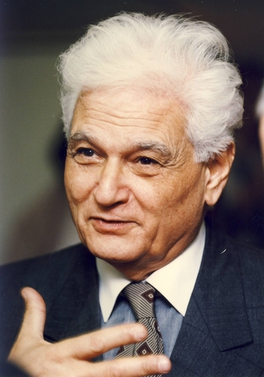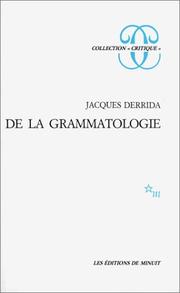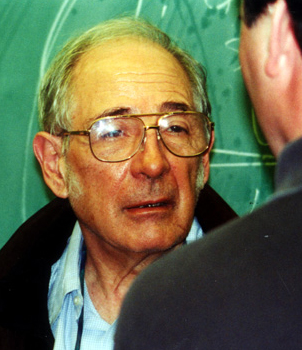Related Research Articles
Deconstruction is a loosely-defined set of approaches to understanding the relationship between text and meaning. The concept of deconstruction was introduced by the philosopher Jacques Derrida, who described it as a turn away from Platonism's ideas of "true" forms and essences which are valued above appearances.
Postmodern philosophy is a philosophical movement that arose in the second half of the 20th century as a critical response to assumptions allegedly present in modernist philosophical ideas regarding culture, identity, history, or language that were developed during the 18th-century Age of Enlightenment. Postmodernist thinkers developed concepts like difference, repetition, trace, and hyperreality to subvert "grand narratives", univocity of being, and epistemic certainty. Postmodern philosophy questions the importance of power relationships, personalization, and discourse in the "construction" of truth and world views. Many postmodernists appear to deny that an objective reality exists, and appear to deny that there are objective moral values.
Post-structuralism is a philosophical movement that questions the objectivity or stability of the various interpretive structures that are posited by structuralism and considers them to be constituted by broader systems of power. Although post-structuralists all present different critiques of structuralism, common themes among them include the rejection of the self-sufficiency of structuralism, as well as an interrogation of the binary oppositions that constitute its structures. Accordingly, post-structuralism discards the idea of interpreting media within pre-established, socially constructed structures.

Structuralism is an intellectual current and methodological approach, primarily in the social sciences, that interprets elements of human culture by way of their relationship to a broader system. It works to uncover the structural patterns that underlie all the things that humans do, think, perceive, and feel.

Literary theory is the systematic study of the nature of literature and of the methods for literary analysis. Since the 19th century, literary scholarship includes literary theory and considerations of intellectual history, moral philosophy, social philosophy, and interdisciplinary themes relevant to how people interpret meaning. In the humanities in modern academia, the latter style of literary scholarship is an offshoot of post-structuralism. Consequently, the word theory became an umbrella term for scholarly approaches to reading texts, some of which are informed by strands of semiotics, cultural studies, philosophy of language, and continental philosophy.

Jacques Derrida was an Algerian-born French philosopher. He developed the philosophy of deconstruction, which he utilized in a number of his texts, and which was developed through close readings of the linguistics of Ferdinand de Saussure and Husserlian and Heideggerian phenomenology. He is one of the major figures associated with post-structuralism and postmodern philosophy although he distanced himself from post-structuralism and disowned the word "postmodernity".
Metaphysics of presence is a view that holds the entire history of Western philosophy, with its language and traditions, has emphasized the desire for immediate access to meaning, based on privileging presence over absence.
Différance is a French term coined by Jacques Derrida. It is central to Derrida's concept of deconstruction, a critical outlook concerned with the relationship between text and meaning. The term différance means both "difference of meaning" and "deferral of meaning".
In critical theory and deconstruction, phallogocentrism is a neologism coined by Jacques Derrida to refer to the privileging of the masculine (phallus) in the construction of meaning. The term is a blend word of the older terms phallocentrism and logocentrism.
"Logocentrism" is a term coined by the German philosopher Ludwig Klages in the early 1900s. It refers to the tradition of Western science and philosophy that regards words and language as a fundamental expression of an external reality. It holds the logos as epistemologically superior and that there is an original, irreducible object which the logos represent. According to logocentrism, the logos is the ideal representation of the Platonic ideal.
Jonathan Culler is an American literary critic. He was Class of 1916 Professor of English and Comparative Literature at Cornell University. His published works are in the fields of structuralism, literary theory and literary criticism.
Structural anthropology is a school of sociocultural anthropology based on Claude Lévi-Strauss' 1949 idea that immutable deep structures exist in all cultures, and consequently, that all cultural practices have homologous counterparts in other cultures, essentially that all cultures are equatable.
"Structure, Sign, and Play in the Discourse of the Human Sciences" was a lecture presented at Johns Hopkins University on 21 October 1966 by philosopher Jacques Derrida. The lecture was then published in 1967 as chapter ten of Writing and Difference.
Difference is a key concept of philosophy, denoting the process or set of properties by which one entity is distinguished from another within a relational field or a given conceptual system. In the Western philosophical system, difference is traditionally viewed as being opposed to identity, following the Principles of Leibniz, and in particular, his Law of the identity of indiscernibles. In structuralist and poststructuralist accounts, however, difference is understood to be constitutive of both meaning and identity. In other words, because identity is viewed in non-essentialist terms as a construct, and because constructs only produce meaning through the interplay of differences, it is the case that for both structuralism and poststructuralism, identity cannot be said to exist without difference.
French philosophy, here taken to mean philosophy in the French language, has been extremely diverse and has influenced Western philosophy as a whole for centuries, from the medieval scholasticism of Peter Abelard, through the founding of modern philosophy by René Descartes, to 20th century philosophy of science, existentialism, phenomenology, structuralism, and postmodernism.
Phonocentrism is the belief that sounds and speech are inherently superior to, or more primary than, written language or sign language. Those who espouse phonocentric views maintain that spoken language is the primary and most fundamental method of communication whereas writing is merely a derived method of capturing speech. Many also believe that spoken language is inherently richer and more intuitive than written language.

Of Grammatology is a 1967 book by the French philosopher Jacques Derrida. The book, originating the idea of deconstruction, proposes that throughout continental philosophy, especially as philosophers engaged with linguistic and semiotic ideas, writing has been erroneously considered as derivative from speech, making it a "fall" from the real "full presence" of speech and the independent act of writing.
Sous rature is a strategic philosophical device originally developed by Martin Heidegger. Though never used in its contemporary French terminology by Heidegger, it is usually translated as 'under erasure', and involves the crossing out of a word within a text, but allowing it to remain legible and in place. Used extensively by Jacques Derrida, it signifies that a word is "inadequate yet necessary"; that a particular signifier is not wholly suitable for the concept it represents, but must be used as the constraints of our language offer nothing better.
Trace is one of the most important concepts in Derridian deconstruction. In the 1960s, Jacques Derrida used this concept in two of his early books, namely Writing and Difference and Of Grammatology.

The Searle–Derrida debate is a famous intellectual controversy opposing John Searle and Jacques Derrida, after Derrida responded to J. L. Austin's theory of the illocutionary act in his 1972 paper "Signature Event Context". In his 1977 essay Reiterating the Differences: A Reply to Derrida, Searle argued that Derrida's apparent rejection of Austin was unwarranted, but later refused to let this 1977 reply be printed along with Derrida's papers in the 1988 collection Limited Inc — in which a new text by Derrida ridiculed Searle's positions on the topic. In the 1990s, Searle clarified why he did not consider Derrida's approach to be legitimate philosophy.
References
- Goody, Jack (1977). The Domestication of the Savage Mind. Cambridge: Cambridge University Press. ISBN 978-0-521-29242-9.